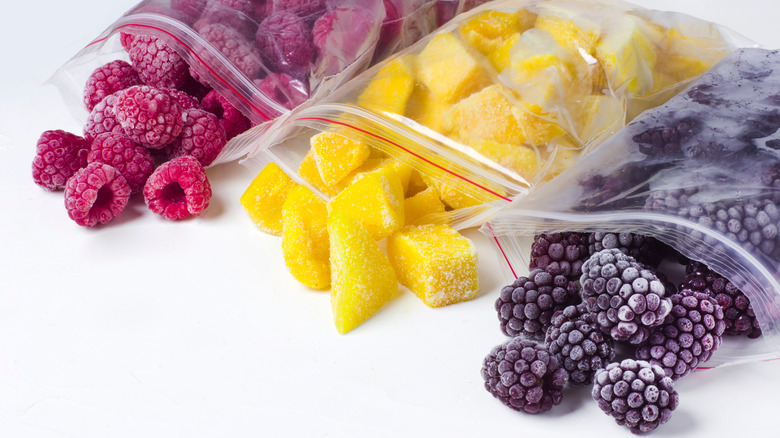Don't Believe This Common Frozen Food Myth
How often do you buy frozen food? We're not necessarily talking about high-fat, high-sodium frozen dinners or greasy frozen pizza, but also frozen ingredients such as berries or vegetables, and meats such as chicken and ground beef. We don't know about you, but when making sure our kitchen is well stocked, we always make sure to pay attention to our freezers, as well.
Frozen food can be a great way to be prepared. With items such as frozen grains, already-chopped vegetables, and picked-at-peak fruits on hand, throwing together a weeknight meal or morning smoothie becomes all that much quicker and easier. Frozen foods sometimes get a bad rap, with many people assuming, variously, that the items are necessarily highly processed, contain added preservatives and chemicals, or are high in sodium — but, as it turns out, those are all myths (via Allrecipes). There's another common fallacy you may have been led to believe about frozen foods.
Frozen food is not less nutritious than fresh
Frozen food can have a bad reputation, yet there's a whole world of healthy frozen foods out there: common, unprocessed whole foods that are available frozen include strawberries, butternut squash, spinach, corn, broccoli, and green beans (via Eat This, Not That!), plus all manner of frozen meats and fish.
Another assumption is that frozen foods are less nutritious than their fresh versions. Some think that elements such as vitamins and minerals are "lost" during the freezing process. But according to Sharp Health News, this couldn't be further from the truth. Frozen foods don't suffer nutritionally, and in many cases the freezing process actually preserves their nutrition better. In the case of fruits and vegetables, which are often frozen at their peak ripeness when they contain the most amounts of vitamins and minerals, they can actually be more nutritious than their fresh counterparts (via CBS Sacramento).
"In terms of the ways humans have come up with preserving foods, freezing comes up at the top for preserving nutrients," Ali Bouzari, a culinary scientist, told CBS Sacramento. "If you can't afford fresh ... it's important for people to know that frozen is a viable alternative."

